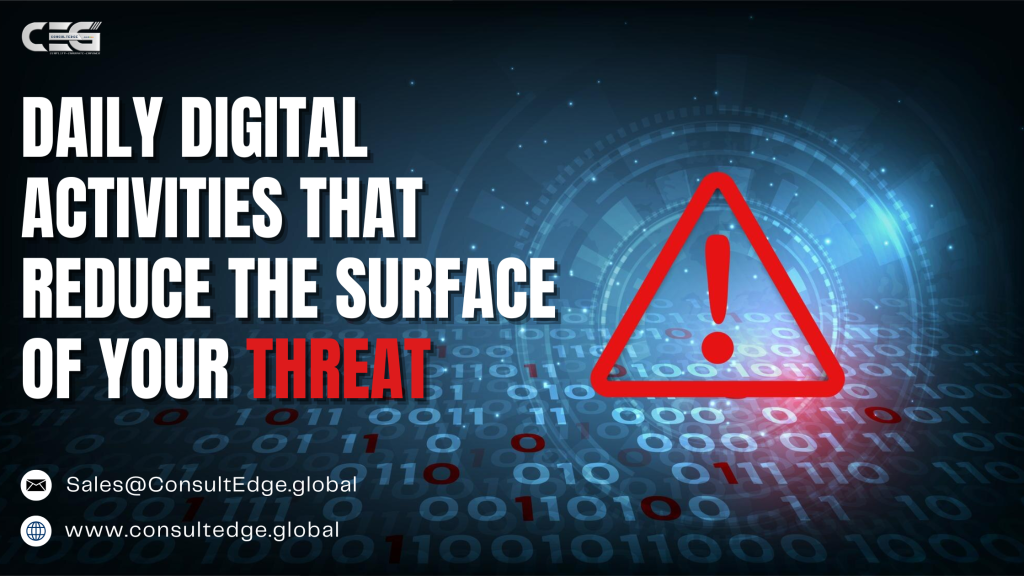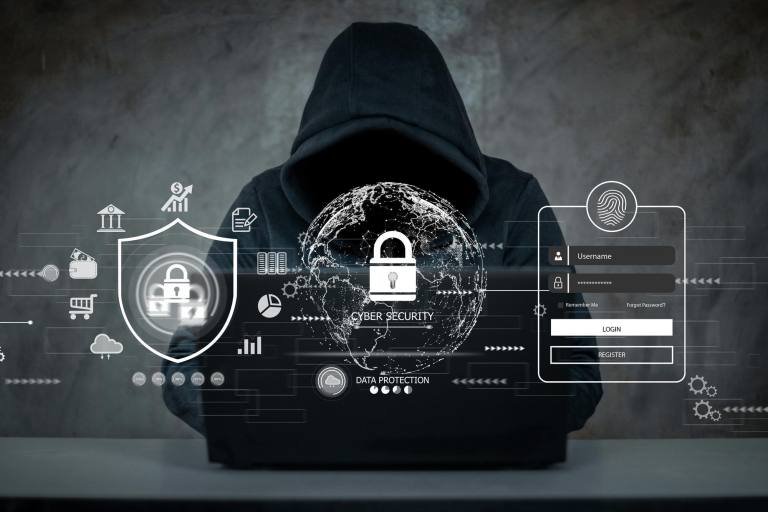
Daily Cybersecurity Routines That Keep You Safe
In the evolving digital world, security isn’t just about deploying firewalls or having the latest antivirus software. Cybersecurity begins with people—and more specifically, the habits they adopt every day. Each device, app, and online interaction adds to your attack surface—the total exposure to potential cyber threats.
The good news? You can shrink that surface daily through small, mindful actions that don’t require you to be a tech expert. These everyday practices not only safeguard your personal identity and data but also play a crucial role in securing your organization.
Let’s explore how simple daily digital behaviours can minimize risk and help you stay safe in the digital world.


What is a Threat Surface?
Before diving into the habits, it’s important to understand the concept. Your threat surface is the total number of points where an unauthorized user (the “threat actor”) can try to enter or extract data from your system. The more devices, software, cloud apps, logins, and behaviors you have, the bigger this surface becomes. A larger threat surface means more vulnerabilities and potential entry points for cyberattacks or data breaches. Managing and reducing these points through proactive security measures, such as updates, strong passwords, and user awareness, is crucial. By understanding your threat surface, you can better identify weaknesses and strengthen your defences to protect your digital environment effectively.
Reducing your threat surface doesn’t mean using fewer tools—it means using them securely and smartly.
1. Locking Your Devices
This may seem basic, but it’s one of the most overlooked steps. Whether you’re working in a shared office or remotely from a café, leaving your screen open is an open invitation for unauthorized access.
Why it matters:
Anyone can quickly copy files, install malicious software, or access sensitive apps without leaving a trace.
Safe habit:
Set auto-lock after a short period (1–5 minutes).
Use strong screen passwords or biometric locks.
2. Updating Software and Operating Systems
Many users delay updates because they think of them as disruptive or time-consuming. However, most updates contain critical security patches that fix vulnerabilities hackers are actively exploiting.
Why it matters:
Outdated systems are one of the top attack vectors in successful breaches.
Safe habit:
Enable auto-updates where possible.
Set a daily reminder to check for pending updates.
Don’t ignore mobile OS and app updates—they’re just as important.
3. Using Secure Networks
It’s tempting to connect to free public Wi-Fi at airports or cafés, but these networks are often unsecured and easily exploited.
Why it matters:
Cybercriminals can intercept your data on public networks using techniques like man-in-the-middle attacks.
Safe habit:
Avoid accessing banking or work platforms without a VPN.
Turn off auto-connect on your devices.
Use your mobile hotspot when in doubt.
4. Managing App and Browser Permissions
Apps and browser extensions often request access to sensitive data and device functions—some of which they don’t actually need to function.
Why it matters:
Excessive permissions can be exploited by malware or misused by the app developers themselves.
Safe habit:
Review app permissions once a week.
Uninstall apps you no longer use.
Be cautious when installing browser extensions—stick to verified sources.
5. Using Two-Factor Authentication (2FA)
Even strong passwords can be compromised. Two-factor authentication adds an extra step of verification, significantly boosting your account’s defence.
Why it matters:
It reduces the chance of a successful breach by over 90%, even if the password is exposed.
Safe habit:
Enable 2FA on all important accounts (email, cloud storage, banking, business apps).
Use an authenticator app (like Google Authenticator or Authy) instead of SMS codes.
6. Being Alert to Phishing and Social Engineering
Every day, phishing emails and social engineering scams attempt to trick users into revealing login details or downloading malicious files.
Why it matters:
Over 80% of data breaches start with human error—often from clicking a malicious link or replying to a fake request.
Safe habit:
Don’t click suspicious links or attachments.
Hover over links to verify the URL.
If a message feels “off,” it probably is—verify via a known contact method.
7. Practicing Good Password Hygiene
Passwords are still the first line of defense—and the easiest to compromise if reused or weak.
Why it matters:
Credential stuffing attacks (where hackers use leaked username/password combinations) are rising rapidly.
Safe habit:
Use a password manager to generate and store strong, unique passwords.
Don’t reuse passwords across services.
Change passwords periodically, especially after a breach.
8. Regularly Backing Up Your Data
Data loss through ransomware, accidental deletion, or device failure is devastating. Backups ensure business continuity and personal data recovery.
Why it matters:
In a ransomware attack, backups are often the only option that avoids paying a ransom.
Safe habit:
Schedule automatic daily or weekly backups to cloud storage or external drives.
Use versioned backups to restore data from different points in time.
9. Logging Out When Not in Use
Staying logged in might be convenient, but it leaves apps and systems vulnerable—especially on shared devices or browsers.
Why it matters:
Persistent sessions are easier to hijack, especially through browser vulnerabilities or stolen devices.
Safe habit:
Log out of sensitive apps daily.
Avoid saving passwords in shared or public computers.
Clear browser sessions and cookies regularly.
Fostering Everyday Security Through Smart Digital Practices
Reducing digital risk begins with secure daily habits and the right foundational practices—like multi-factor authentication, regular patching, and real-time monitoring. With guidance and solutions from ConsultEdge.Global, these measures are seamlessly integrated into business operations, enabling a shift from reactive defence to a more resilient, proactive approach.
In Conclusion
Cybersecurity doesn’t start in the IT department—it starts with you. By adopting simple, consistent habits, you significantly reduce the risk of compromise. Every locked screen, updated app, cautious click, and secure login matters.
When individuals commit to these practices daily, organizations become stronger, safer, and more resilient.
You May Also Like
 Ensuring Compliance and Governance with Sophos Solutions
Ensuring Compliance and Governance with Sophos SolutionsEnsuring Compliance and Governance with Sophos Solutions Comprehensive Security and Compliance Across Enterprise Environments Modern...
 خدمات وحلول سحابة AWS الموثوقة في دبي وعبر الإمارات
خدمات وحلول سحابة AWS الموثوقة في دبي وعبر الإماراتخدمات وحلول سحابة AWS الموثوقة في دبي وعبر الإمارات تحول سحابي شامل بخبرة شريك AWS...
 تأمين بيئات DevOps باستخدام حلول Sysdig للمؤسسات في الإمارات
تأمين بيئات DevOps باستخدام حلول Sysdig للمؤسسات في الإماراتتأمين بيئات DevOps باستخدام حلول Sysdig للمؤسسات في الإمارات تتبنى دبي والإمارات DevOps لتسريع توصيل...



